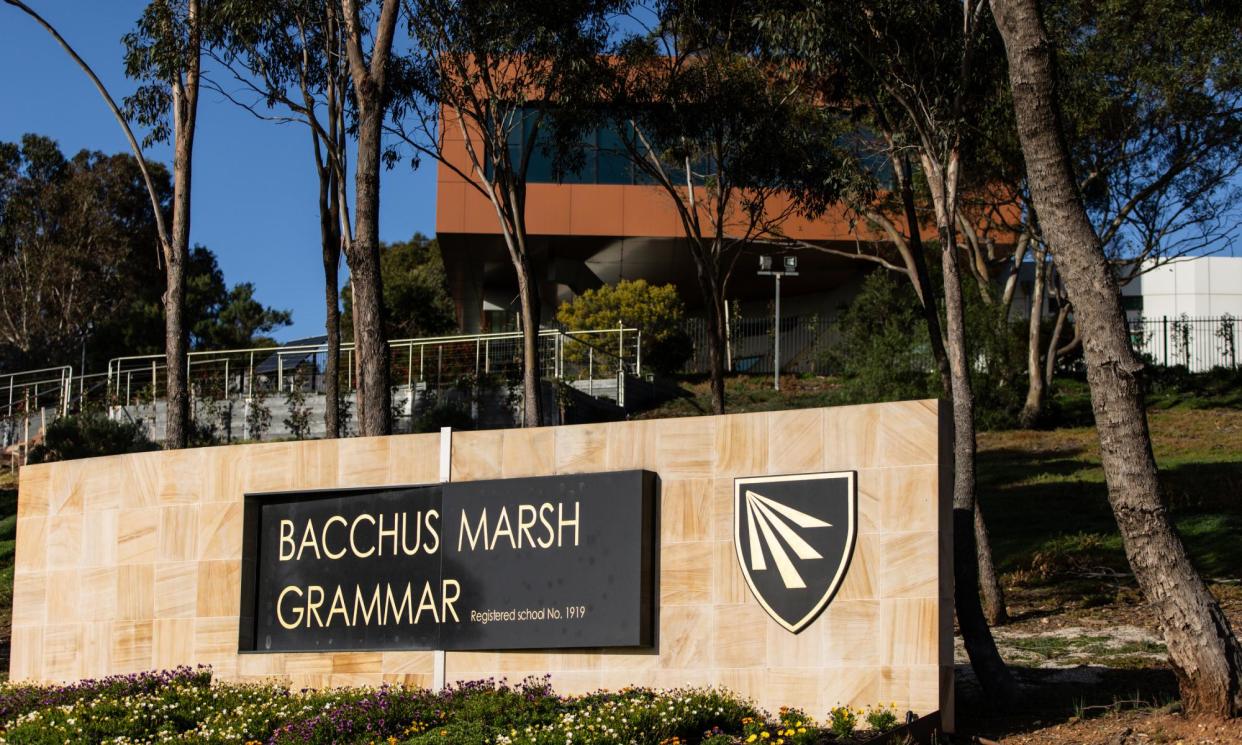Bacchus Marsh Grammar: schoolboy arrested after 50 female students allegedly targeted in fake explicit AI photos scandal

A teenage boy has been arrested and then released after fake explicit images, described as “mutilated” and “incredibly graphic”, were allegedly circulated on social media using the likenesses of about 50 female students from a private school in regional Victoria.
The principal of Bacchus Marsh Grammar, Andrew Neal, told the ABC about 50 girls had been targeted.
The nude images appeared to have been created using artificial intelligence and photos of the girls’ faces taken from social media sites, and were then circulated online.
“[The girls] should be able to learn and go about their business without this kind of nonsense,” Neal told the ABC.
Related: Making deepfake images is increasingly easy – controlling their use is proving all but impossible
A woman named Emily, the parent of one Bacchus Marsh Grammar student and a trauma therapist, said she saw the photos when she picked up her 16-year-old daughter from a sleepover on Saturday night.
Emily had a bucket in the car for her daughter who was “sick to her stomach” on the drive home, she told ABC Radio Melbourne on Wednesday.
“She was very upset, and she was throwing up. It was incredibly graphic.”
Emily’s immediate reaction was also “to be sick”.
“I mean they are children … The photos were mutilated, and so graphic. I almost threw up when I saw it.”
“Fifty girls is a lot. It is really disturbing.”
The victims’ Instagram accounts were private, Emily said. Though her daughter did not appear in the deepfake images, “there’s just that feeling of ... will this happen again? It’s very traumatising.”
“How can we reassure them that once measures are in place, it won’t happen again?”
Acting principal Kevin Richardson said in a statement: “Bacchus Marsh Grammar is taking this matter very seriously and has contacted Victoria police.
“The wellbeing of Bacchus Marsh Grammar students and their families is of paramount importance to the school and is being addressed. All students affected are being offered support from our wellbeing staff.”
Richardson said the school had not been contacted by police regarding anyone arrested in relation to the matter.
Victoria police said officers were informed that a number of images were sent to a person in the Melton area, which is about a 15-minute drive from Bacchus Marsh, via an online platform on Friday 7 June.
Police said the teenage boy was arrested in relation to the incident, but had been released pending further inquiries.
“The investigation remains ongoing,” police said.
It comes after a student from Salesian College, a Catholic boys’ school in Chadstone in Melbourne, was expelled after he used artificial intelligence to produce explicit images of a female teacher.
In June the federal government introduced legislation to ban the creation and sharing of deepfake pornography as part of measures to combat violence against women.
But the Nationals senator Matt Canavan said there was a broader cultural problem that needed to be addressed.
“It is a cultural issue across our society that, for whatever reason, the standards of behaviour are not being taught to young boys,” he told Nine on Wednesday morning.
“I wish I had the answers – I don’t – but I don’t necessarily think it’s something a government or a law can change.
“We’ve all got to chip in to try and make sure that young boys understand what it means to grow up to be a man and live by the standards that society expects.”
Technology had “supercharged” boys’ bad behaviour, Canavan said.
Victoria’s health minister, Mary-Anne Thomas, said she was “deeply distressed” to read of the incident.
“This type of behaviour is absolutely abhorrent. Schools should be safe places for children and young people to learn,” she said on Wednesday.
While Thomas said she did not want to comment specifically on the incident, she said she hoped it would be a “wake up call” to the dangers of AI-generated sexually explicit images and social media.
“We need to be having direct and real conversations with young people about respect,” she said.
“Because quite clearly, young people are accessing material on the internet, and through social media, that is influencing their behaviours in ways that I think we all agree are out of step with community expectations – and indeed are beyond that, [and are] actually causing real harm to other young people.”
Image-based abuse, including deepfakes, can be reported to eSafety, which claims “a 90% success rate in getting this distressing material down”.

 Yahoo News
Yahoo News 
